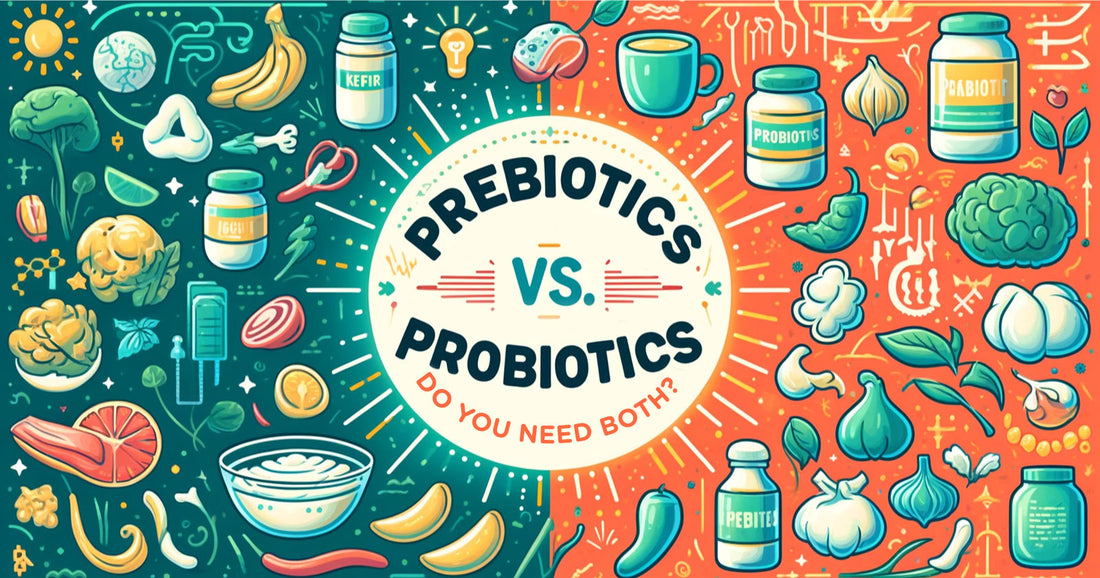
Prebiotics vs. Probiotics: What’s the Difference? Do You Need Both?
In the world of gut health, the terms "probiotics" and "prebiotics" often get tossed around, sometimes interchangeably, leading to confusion. Despite their similar-sounding names and frequent pairing in health recommendations, they serve distinct yet complementary roles in your digestive system. Understanding the difference between these two can be crucial for maintaining optimal gut health.
What Are Probiotics?
Probiotics are live microorganisms, often referred to as "good" or "friendly" bacteria, that reside in your gut. These beneficial bacteria are essential for maintaining a balanced gut flora, aiding in digestion, and supporting your immune system. Probiotics are especially important after events that can disrupt the gut’s natural balance, such as taking antibiotics, enduring periods of high stress, or suffering from digestive issues.
Including probiotics in your diet can help replenish these good bacteria, promoting a healthy balance in your gut microbiome. A well-balanced microbiome not only supports digestion but also plays a role in preventing the growth of harmful bacteria, improving nutrient absorption, and even influencing your mood.
What Are Prebiotics?
While probiotics are the beneficial bacteria themselves, prebiotics are the food that fuels them. Prebiotics are non-digestible fibers found in certain foods that act as a sort of fertilizer for the probiotics in your gut. By feeding the good bacteria, prebiotics help these microorganisms grow, thrive, and multiply, enhancing their beneficial effects on your health.
Without sufficient prebiotics, the probiotics in your gut wouldn't be as effective in performing their vital functions. Essentially, while probiotics introduce good bacteria into your system, prebiotics ensure that these bacteria are well-nourished and able to flourish.
Why You Need Both for Optimal Gut Health
For optimal gut health, it's essential to incorporate both prebiotics and probiotics into your daily diet. Think of it like planting a garden: probiotics are the seeds, and prebiotics are the water and sunlight that help those seeds grow into strong, healthy plants. Without one, the other cannot thrive.
When both prebiotics and probiotics are present in your diet, they work together to maintain a healthy balance of gut bacteria, which can lead to improved digestion, enhanced immune function, and even better mental well-being. This symbiotic relationship is why you often hear them mentioned together in discussions about gut health.
Good Sources of Probiotics
You can introduce probiotics into your diet through a variety of fermented foods. These foods are naturally rich in live cultures of beneficial bacteria. Some of the best sources of probiotics include:
- Yogurt: Especially beneficial is homemade yogurt made with our Ultimate Probiotic Yogurt Maker, which allows you to control the quality and potency of the probiotics in each batch.
- Kefir: A fermented milk drink similar to yogurt but with a thinner consistency and a slightly tangy taste.
- Sauerkraut: Fermented cabbage that's rich in probiotics and fiber, making it great for gut health.
- Kimchi: A spicy Korean side dish made from fermented vegetables, often including cabbage and radishes.
- Miso: A traditional Japanese paste made from fermented soybeans, often used in soups.
Good Sources of Prebiotics
Prebiotics are found in various fiber-rich foods. Incorporating these into your diet will help nourish the probiotics in your gut:
- Garlic: A flavorful addition to many dishes and a potent prebiotic.
- Onions: Commonly used in cooking, onions provide a good source of prebiotics.
- Bananas: A convenient and nutritious snack that also supports gut health.
- Asparagus: A versatile vegetable that's high in prebiotic fibers.
- Chicory Root: Often used as a coffee substitute, chicory root is loaded with inulin, a type of prebiotic fiber.
- Leeks: A close relative of onions and garlic, leeks are another excellent source of prebiotics.
- Inulin Powder: A concentrated source of prebiotic fiber that can be mixed with your favorite probiotic to make the perfect yogurt starter. Using inulin powder with our Ultimate Probiotic Yogurt Maker can help you create the strongest probiotic yogurt possible.
Conclusion: The Dynamic Duo for Gut Health
To achieve and maintain optimal gut health, it's crucial to include both prebiotics and probiotics in your diet. Together, they create a healthy and balanced gut environment that supports not only digestion but also overall well-being.
For more tips on how to create the best starter for your yogurt and get the most out of your Ultimate Probiotic Yogurt Maker, check out our Ultimate Probiotic Yogurt Guide. Incorporating these insights into your daily routine can help you harness the full potential of probiotics and prebiotics, leading to a healthier, happier you.
